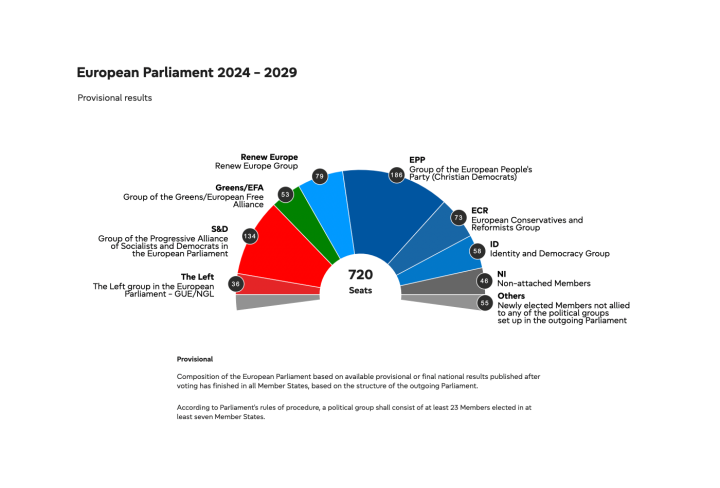- Category
- Latest news
Key Takeaways from the 2024 EU Parliamentary Elections Seat Projections
On May 9, the European Parliament elections concluded with the pro-European and pro-Ukrainian “European People’s Party” securing the largest number of seats, totaling 185.
This result bodes well for Ukraine.

The European Parliament stands as one of the primary decision-making and budget allocation bodies within the EU. It is composed of representatives from member countries, reflecting the diverse political landscape of Europe. The Parliament plays a crucial role in shaping EU legislation and policies.
Here are the key highlights based on final and provisional June 9 results in 26 countries and pre-electoral data per country:
In Germany, the conservative opposition party “Christian Democratic Union” (30.3%), led by Ursula von der Leyen, came out on top. With 96 out of the total 720 seats in the parliament, Germany is likely to have considerable influence.
In France, the far-right National Union party of Marine Le Pen won (31%). France will have 81 seats in the European Parliament. Due to the loss of his party (14%), Macron dissolved the Assemblée Nationale and called early parliamentary elections.
In Italy, the “Brothers of Italy” party of Italian Prime Minister Giorgia Meloni won (28.9%). Italy will have 76 seats in the parliament.
In Spain, the opposition “People’s Party” wins (34.18%). Spain will have 61 seats in the EU Parliament.
Donald Tusk’s “Civil Coalition” won in Poland (38.2%), and together with Andrzej Duda’s previously ruling “Law and Justice” party (33.9%), both won 20 seats in the parliament out of 53 common seats.
The political alliance “New Unity” wins in Latvia (25.07%) with Latvia securing 9 seats in the parliament.
In Lithuania Christian Democrats led by the head of the Ministry of Foreign Affairs, Gabrielus Landsbergis, have won (21.33%). Lithuania will have 11 seats in the parliament.
Christian Democrats Isamaa won in Estonia (21.6%). Consequently, the country will have 7 seats.
In Finland, the ruling party, the “National Coalition,” led by Prime Minister Petteri Orpo (24.8%), secured 15 seats in the parliament.
In the Czech Republic, the populist movement ANO 2011 emerges as the winning party with 26.14% of the vote. Consequently, the country will hold 21 seats in the EU Parliament.
Prime Minister Mette Frederiksen’s Socialdemokratiet party wins in Denmark (17.20%), securing 15 seats in the parliament
In Austria, the pro-Russian “Austrian Freedom Party” is in the lead with 27% of the vote, securing 20 seats in the parliament for the country.
In Belgium, the “Flemish Nationalist Party” won (23%), and the country’s Prime Minister announced his resignation. Belgium is set to have 22 seats in the parliament.
In Bulgaria, the populist coalition “Citizens for European Development in Bulgaria” (GERB) is the leader (26.5%). The country will hold 17 seats in the parliament.
In Croatia “Croatian Democratic Party” won (33.09%), securing 12 seats for the country in the parliament.
“Democratic Union” wins in Cyprus with 24.40% of the vote, earning the country 6 seats in the parliament.
Viktor Orban’s right-wing populist and national-conservative political party Hungarian Civic Alliance FIDEZS is leading in Hungary with 43.76% of the vote. The party will have 21 seats in the parliament as a result.
In Luxembourg, the “Christian Social People’s Party” won (22.91%) with 6 seats in the parliament.
Prime Minister Robert Abel’s Labor Party wins in Malta (45.26%) with 6 seats in the parliament.
The GroenLinks-PvdA, or GreenLeft–Labour party, of the former Vice President of the European Commission Frans Timmermans wins in the Netherlands (21.1%). The Netherlands will have 31 seats in the EU Parliament.
Socialists have won in Portugal (32.33%). The country will have 21 seats in the parliament.
In Romania, the “Social Democratic Party” of Prime Minister Marcel Čolaka won with 53% of the votes. The country will have 33 seats in the parliament.
In Slovakia, the opposition party “Progressive Slovakia” took first place (27.8%), securing 15 seats for the country in the parliament.
In Slovenia, the “Slovenian Democratic Party” emerged on top with 31.79% of the vote, granting the country 9 seats in the parliament.
In Greece, the “New Democracy” movement of Prime Minister Kyriakos Mitsotakis retained the lead (27.96%). Greece will have 21 seats in the parliament.
The opposition “Social Democratic” party won in Sweden (25.1%). Sweden will have 21 seats in the parliament.
The largest number of seats in the parliament was won by the pro-European and pro-Ukrainian party “European People’s Party” with 185 seats, which is generally a positive signal for Ukraine.
The European People’s Party (EPP) securing the most seats in the European Parliament indicates strong support for European integration and solidarity with Ukraine. This result is particularly significant for Ukraine as it navigates ongoing geopolitical challenges and seeks closer ties with the European Union.
-ba02b3bc86f0b624f99115809a6a34d0.jpg)

-72b63a4e0c8c475ad81fe3eed3f63729.jpeg)


